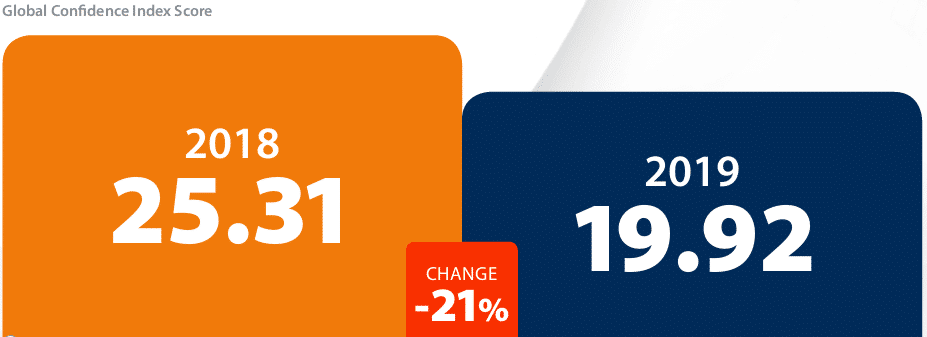
CEOs’ economic optimism collapses worldwide
WorldCom PR Expertise
Posted 12 Nov 2019
As a long-time partner of the Worldcom PR Group, we present the Confidence Index 2019. With the help of artificial intelligence, the study surveyed and evaluated the confidence of around 58,000 executives.
In our blog post Data-Driven PR for Companies, we already dealt with the topic of how companies improve their ROI and create targeted content for customers through data-driven work. Now we share the results of how the Worldcom PR Group is using data-driven working and artificial intelligence to raise data about CEO optimism in the economy.
“What’s special about this year’s Confidence Index is that it uses artificial intelligence to process the data that Worldcom used for this analysis. The insights provided by this modern form of data collection are fundamental,” says Corinna Voss, Managing Director of HBI PR in Munich. “A language-independent mood barometer raised by the data of nearly 60,000 CEOs and CMOs! That would not be possible without a trained algorithm”.
Download this year’s Confidence Index for free

This year, Worldcom engaged Advanced Symbolics Inc., a market research firm that uses artificial intelligence to track and interpret publicly available social media content. This year’s report examined data from nearly 60,000 business leaders, showing how their opinions and intentions have changed over time.
“Worldcom used artificial intelligence to perform important market research for this year’s confidence index, showing that they are innovative and understand the key benefits AI provides PR firms and professionals,” said Erin Kelly, chief executive officer of Advanced Symbolics Inc. “Our AI tracked a sample of nearly 60,000 business leaders from 15 different countries – a big increase from previous years.”
Along with global confidence, the report measures the importance of reaching specific audiences and the confidence levels that c-suite executives have in reaching those audiences. In 2018, CEOs were most concerned with reaching customers, but respondents in the 2019 research report are most concerned with influencers, which grew 160 percent from 2018 to 2019, followed by customers and employees. However, CEO confidence in reaching influencers remains quite low. Leaders are more confident in their abilities to reach shareholders, customers, suppliers, and even government officials.
“Influencers were an audience in decline in 2018 but leaped to the front of the pack in this year’s report,” said Hurni. “The growth of this audience could suggest that leaders feel they need the support of influencers to help them navigate their way through turbulent times.”
Another issue CEOs and CMOs are managing is the retention of current employees. Leaders have low confidence in their abilities to retain talent. Firms in the United Kingdom and the United States rank last and second-to-last respectively, in their confidence to retain employees. This is just one of five employee-related issues that feature in the top six topics discussed globally. Economic migration is a cause for concern globally – most notably in the U.S., which had the lowest Confidence Index score. The number one topic aired by leaders is upskilling and reskilling employees. The U.K. had the lowest score for this topic, and Japan the highest. Improving skills is just one of many areas leaders are exploring to keep employees loyal and engaged.
“Just like last year, what is keeping CEOs up at night is retaining top talent. This year they also want to ensure employees have the right skills in an evolving and dynamic workplace,” said Hurni. “What’s also clear from the report is that employment benefits need to be a part of a retention and attraction strategy.”
The Worldcom Confidence Index highlights concerns/confidence across 23 topics and six audiences. We have outlined the top 10 findings in what we call, “The Worldcom Confidence 10.”
Picture 2: Confidence about retaining talent
#1 Confidence levels implode – down 21 percent
• The United States is the biggest faller (down 51 percent) and Japan the biggest riser
#2 Influencers become #1 audience for leader attention but have the second-lowest Confidence Index score
• The impact and role of the media has the lowest CI score
#3 Employee related topics dominate leaders’ agenda
• Upskilling and reskilling the most discussed topic
• Employee related topics take five out of the top six topic places
• The Worldcom Confidence Index score for employees lowest of all audiences
#4 Leaders have concerns about their corporate image and brand reputation and their ability to protect it in a crisis
#5 Global trade agreements and tariffs undermine confidence
#6 Confidence declines in the ability to satisfy customers – especially in the U.S. – but remains higher than other business topics
#7 Global Worldcom Confidence Index scores show that events that affect us all, like global warming, trigger very different reactions in our leaders
#8 Government and legislators getting much more attention and their changes are a cause for concern
#9 A marked shift in attitude to the impact of the way political leaders communicate on social media
#10 Cybercrime no longer a global cause for concern but a big issue for South American leaders
The study was able to operate at this scale, and in nine different languages, because the data was captured using a breakthrough approach powered by artificial intelligence (AI). The chosen research firm, Advanced Symbolics Inc (ASI), has developed a patented method of building representative samples and then capturing information with their AI tool.
“We are delighted to be the first organization to use AI in this way and on this scale,” said Hurni. “It’s further proof of the way Worldcom partners around the world use innovative solutions to deliver immediate results and lasting solutions for clients. We chose ASI’s approach because it’s proven to be incredibly accurate. Only last month, they were the only research firm to accurately predict the outcome of the Canadian elections by using their AI tool. We will be adding to this research over the coming months to deliver invaluable insight to our clients in particular and business leaders in general.”
The full report and other media assets can be downloaded here.